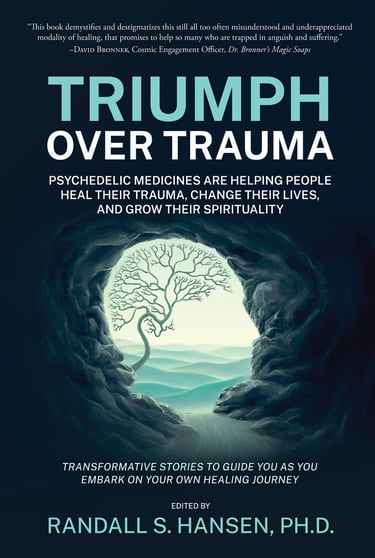How and Why Eggs Should be a Key Part of Your Diet
How do you really feel about eggs?
As a health advocate, I am a big proponent of eggs -- as long as they're from pastured, free-ranging, happy hens. In fact, a habit we started on the road years ago we continue to this day: enjoying eggs for dinner several nights a week. (We are not big breakfast eaters, but we do sometimes have eggs for breakfast.) We easily consume a dozen eggs weekly.
As a healthy food advocate, I am so frustrated with food labeling -- and all the confusing and allowable words/terms used to market eggs to unaware consumers. Keep reading for my tips on deciphering the labels.
Let's start with the benefits -- and why -- you should be consuming eggs, as long as you are allergy-free. Then we'll move on with how to buy the best eggs.
Note: As with any changes you might make in your diet, please conduct your own research and consult with your doctor.
Health Benefits of Eggs
Eggs are so jam-packed with nutrients that many refer to them as nature's multivitamin.
Eggs are loaded with vitamins, minerals, high-quality protein, good fats, and various other lesser-known nutrients.
Specifically, eggs contain:
Vitamin D: essential for the maintenance of healthy bones and teeth -- and immune support
Vitamin B12 (cobalamin): essential in the formation of red blood cells and DNA
Vitamin B2 (riboflavin): necessary for cell growth, energy metabolism, red blood cell development, healthy vision, and functioning of the nervous system
Vitamin A: vital in sustaining healthy skin, supporting immune function, maintaining good vision and promoting general reproductive health
Vitamin B5 (pantothenic acid): plays a significant role in converting food into active energy and breaking down fats
Vitamin E: has beneficial antioxidant properties that play a pivotal role in maintaining good general health -- including heart health -- with studies linking it to lower rates of heart disease
Choline: plays a vital role in brain development and function
Lutein and Zeaxanthin: vital antioxidants, which protect your cells from damage, especially with the eyes, reducing the risk of macular degeneration and cataracts.
Selenium: produces a category of enzymes known as selenoproteins, which are antioxidants that can inhibit the DNA-damaging ability of free radical compounds
Iron: an essential dietary mineral that is involved in various primary functions
Small amounts of many vitamins and minerals required by the human body, including calcium, iodine, folate, phosphorus, potassium, zinc, manganese
Eggs are also a great source of Omega-3 fatty acids, which are essential for general health and well-being, including the long-chain type of omega-3 fatty acid. Omega-3s help reduce triglycerides and help fight inflammation, heart disease, auto-immune diseases, cognitive decline, and rheumatoid arthritis. (Yes, fish, nuts, and seeds are also great sources of Omega-3 fatty acids, but for those who don't like or can't eat these foods, eggs are a great substitute. Fish oil/algae supplements also a great source for Omega-3.)
Eggs are truly heart-healthy -- and can actually improve your cholesterol profile -- which is the opposite of what medical and nutritional experts had been saying for years... incorrectly.
Studies show that eggs raise HDL (the "good") cholesterol and they tend to change the LDL (the "bad") cholesterol to a large subtype, which is not as strongly associated with an increased risk of heart disease. Higher levels of HDL have been found to lower risk of heart disease, stroke, and other health issues. (Side note: Foods high in unhealthy saturated fats and trans-fats such as deep-fried fast foods and inflammatory seed oils are the key culprits of increased risk levels of LDL cholesterol.)
The Best Eggs for Your Health
The bad news for consumers is that many of the eggs available for sale at your local supermarket or big box store are industrial/factory eggs -- from hens that are kept in cages in tight quarters, being fed a grain-based diet that affects the nutritional value of the eggs. These hens are often also injected with antibiotics to prevent disease because the hens are in such close quarters.
Have you ever seen any of these commercial egg factory facilities? They are long, low buildings that often house tens of thousands of hens, making it impossible for these hens to be raised the way they should be raised -- foraging for food in outside, in pastures -- not locked up inside dank buildings. (For more details, check out Food, Inc., a 2008 documentary on factory farming/foods.)
The best source of eggs is your local egg farmer... including people who are raising egg-laying chickens in backyards in suburbia as well as rural areas. Please make the effort to find these folks -- ask your friends and neighbors, join Facebook groups for local farmers/ranchers, and use a site like LocalHarvest.org. You should also be able to find local eggs at farmer's markets and food co-ops. These eggs will be the best-tasting and most-beneficial you have ever had.
If you have to buy conventional supermarket eggs, seek out organic brands, eggs labeled from pasture-raised hens, or eggs from local producers. Given how relatively inexpensive eggs are compared to their value, find ways to invest in the more expensive, healthier egg brands.
Please do NOT believe all the fake marketing labels that are allowed for mass-sold/factory eggs. Ignore these labels:
Natural: means absolutely nothing, but it sounds good, right?
Farm-Fresh: same as natural -- means nothing -- but enticing to consumers.
Antibiotic-Free: refers to the regulation that while hens are actively egg-laying, they have not been given antibiotics -- but it does not mean the chickens were never given antibiotics.
Hormone-Free: growth hormones have been illegal for egg-laying hens for decades, so this label means nothing since all commercial eggs must be hormone-free.
Cage-Free: means the chickens are not kept in individual cages, but can still be kept continually indoors in crowded barns.
Free-Range: means the chickens have "some access" to outside, but does not mean the chickens ever actually step outside the cage/barn.
Vegetarian: This label/strategy makes no sense; chickens should not be fed a vegetarian diet, as they are omnivores and love digging up and munching on grubs and worms -- which also increases the nutritional value of the eggs.
Additional Egg Resources


Dr. Randall Hansen is an advocate, educator, mentor, ethicist, and thought-leader... helping the world heal from past trauma. He is founder and CEO of EmpoweringSites.com, a network of empowering and transformative Websites, including EmpoweringAdvice.com.
He is the author of the groundbreaking Triumph Over Trauma: Psychedelic Medicines are Helping People Heal Their Trauma, Change Their Lives, and Grow Their Spirituality and the well-received HEAL! Wholeistic Practices to Help Clear Your Trauma, Heal Yourself, and Live Your Best Life.
Dr. Hansen's focus and advocacy center around true healing ... healing that results in being able to live an authentic life filled with peace, joy, love. Learn more by visiting his personal Website, RandallSHansen.com. You can also check out Dr. Randall Hansen on LinkedIn.






